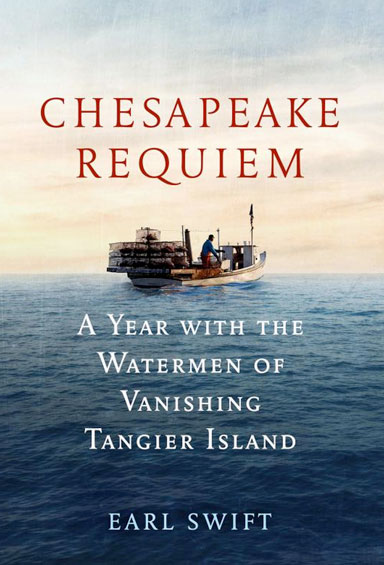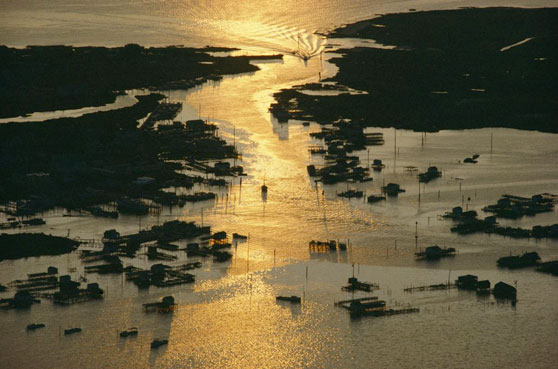As Climate change obliterates Trump-country, dissonance and denial sets in. Profoundly religious and obedient, the Tangier Island residents pray to their God and vote for President Trump, even as the water reclaim more and more of their island each day. National Geographic describes it this way, “As Tangier Island, in the Chesapeake Bay, sinks and the surrounding water rises, its marshland is drowning, steadily giving way to open water.” Yet for Tangier Island’s inhabitants, argue that it’s natural erosion that is claiming their land, not climate change.

Known for its famous soft shell crab, Tangier Island, a tiny sliver of mud and marsh grass in the middle of the Chesapeake Bay, is one of America’s most isolated communities. A new book takes a dim view of Tangier Island’s future and that of numerous other low-lying communities worldwide, resulting from climate change. North Carolina’s barrier islands, known as the Outer Banks, are also eroding as the sea level rises, which means that some land and homes will be swallowed by the ocean.
In his new book, Chesapeake Requiem, author Earl Swift paints a gloomy picture of how climate change’s rising seas are eating into landmasses like Tangier Island and others and threaten their extinction.
When National Geographic caught up with the author at his home in Charlottesville, Virginia, in 2018, he laid out the damning realities of Tangier Island’s future extinction. Religion is the be all end all for Tangier’s deeply religious islanders. They are yet to recognize science as a legitimate factor in life. And while their island is disappearing into the marshes under their noses, they vote overwhelmingly for Donald Trump – the man who would unleash the fossil fuels’ destruction of their landmass.
Tangier Island – “A Community Unlike Any in America.”
Author Earl Swift:
Tangier Island is a squiggle of mud and marsh in the middle of the Chesapeake Bay, which is about 30 miles wide at that point, and a dozen miles from the nearest mainland port, Crisfield, Maryland. It is home to roughly 460 people, all of them descended from the first settler on the island, a guy named Joseph Crocket, who moved there in 1778. Though it’s only 100 miles from Washington, D.C., it’s among the most isolated communities in the East. The island’s isolation has spawned a style of speech that you’ll not hear anywhere else in America.
For 240 years, the islanders have earned their sustenance from the waters surrounding the island, which are rich in fish, crab, and oysters. They’ve especially made a name for themselves in harvesting the Chesapeake Bay blue crab, which is the chief ingredient for Maryland-style crab cakes. They are also the world’s primary source for soft shell crab, a delicacy that many restaurants on the Eastern seaboard serve.
Islanders Believe Climate Change “A Hoax”

Earl Swift believes that rising sea levels from Climate Change may make the island uninhabitable in 50 years, yet the inhabitants refuse to face reality:
It’s a deeply religious place, peopled by old-school Methodists, more akin to the old Shouting Methodists of pre-Civil War U.S. And sometimes faith is all a Tangier man has. When you’re out in a shallow crab boat in five-foot seas and the deck is pitching like a bad carnival ride, faith is a natural thing to turn to because at times like those you only have so much control of your circumstances.
“I don’t think the islanders find the rising water around them to be a hoax. They can see it happening with their own eyes. But they believe that simple erosion, caused by wind-driven waves, has been the cause of the island’s shrinkage, which has lost an average of 8 acres per year since 1850. Clearly, if you take a step back and look at what’s happened here, wind-driven erosion does not explain what’s occurring. Not only do you have water chipping away at Tangiers’ edges, you also have it percolating up through the ground. This is an amphibious place to live. The slightest storm brings water up out of the marsh and the roads, and an astronomical high tide will make ponds of everyone’s yards. A lot of what’s happening—the ponding, the drowning of the marsh, the widening of internal waterways—are standard by-products of climate change-induced sea-level rise.”
Tangier Island’s Economy – Soft Shell Crab Exportation
Tangier lives a calendar defined by sea life. From March until November, the men fish up crab. From December through the end of February, they go after oysters. The crabbing fleet is divided into two. Some Tangier men fish up hard-shell crabs, which are the kind you see at backyard crab boils, and whose meat winds up in crab cakes. A perhaps greater number chase soft shell crabs, or “peelers,” which are hard crabs about to molt.
Staunch Climate Change Denying Trump Supporters
I’m not sure that I can explain it, Simon. It’s certainly not restricted to Tangier. People of religious communities all over the U.S. went overwhelmingly for Trump in 2016. In Tangier’s case, there was some political pragmatism built into the vote. They saw him as somebody who could hurry up the federal government’s response to their existential problem. They bought into the notion that he was a wildly successful businessman who had always been able to get things done, and that trumped, so to speak, any reservations they might have had. And they remain staunchly pro-Trump today.
Of course, the notion that a town threatened by climate change—the canary in the coalmine, so to speak—had backed a candidate who had proclaimed climate change a hoax attracted a steady stream of reporters, both foreign and domestic. Then, in June 2017, CNN showed up, led by meteorologist Jennifer Gray, who interviewed Ooker and several other townspeople at their afternoon coffee klatch. During their interview Ooker declared that he “loved Trump as much as any family member I’ve got.” And that is what set off the media storm. Three days after that comment aired, Trump called Ooker and assured him that he had nothing to worry about, that Tangier Island had been there for hundreds of years and, as he put it, “I believe it’s gonna be there for hundreds more.”
For the islanders the public response to both the CNN story and Trump’s call was, and still is, a shock. People were saying things like, “Let ‘em drown!” and “Hey, if they voted for that idiot, to hell with them!” No matter how you come down in the political spectrum, what happened was sickening.
Future Outlook for Communities like Tangier Island
Earl Swift believes that communities like Tangier will be the beginning of a painful story in America and globally as Climate Change takes hold. Lacking the time, money, and technical means to save every place, societies will have to decide what to save and what to surrender to rising sea-levels. Big cities like New York or Miami will be the focus on efforts to combat Climate Change, but small places like Tangier Islands and areas of the Maldives, for example, might not be spared.
If you like this story, please subscribe and share, if possible
